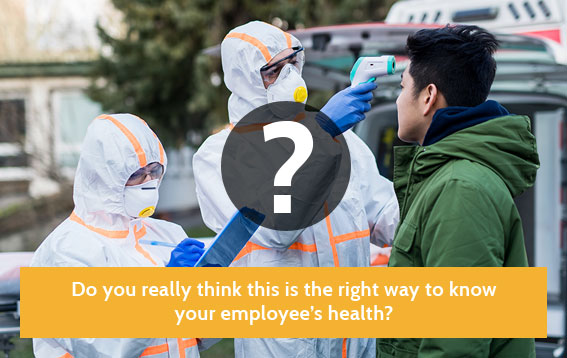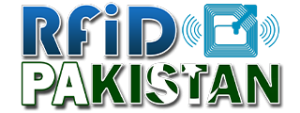RFID Body Temperature Monitoring for Employees
- Home
- Pages

RFID Body Temperature Monitoring For Employees:
COVID-19 is a genuine shock to daily life. Businesses are set to redefine seating at offices, working at factories and plants, and on fieldwork. The truth
th that manufacturers in all industry sectors know all too well: “You can’t build products working from home.” As law offices, financial services firms, tech companies, and much more close their doors in a post-COVID-1 situation and may request employees to “work from home,”, manufacturers face the reality that manufacturing requires employees to work on-site.
There is no factory production work from home. But the challenge to staff a factory becomes much more daunting every day during this COVID-19 pandemic, with emphasis on social distancing, and avoiding groups of people. India Inc. will reset its workspaces once work resumes after the lockdown, with large-scale behavioral and physical space alterations on cards. Businesses also expect the use of office workspace to be drastically different from the pre-Covid era, where optimizing office space was essential.
We recently conducted a manufacturers’ online discussion involving scores of manufacturers from numerous industry sectors to share ideas about how manufacturers can continue to operate in the face of this pandemic. Here are some of the discussion points and ideas & practices identified in that discussion.
HOW DO FIND HIGH-RISK EMPLOYEES?
Manufacturers may have to move decisively to identify and exclude from the workplace those employees who have symptoms of the COVID-19 illness (i.e., fever, cough, runny nose, sore throat, or difficulty breathing)—in fact, the Ministry of Home Affairs (Disease Control and Prevention) recommends in guidance that employers “actively encourage sick employees to stay home.” Where feasible, it could be better to go one step further and identify and exclude from the factory employees who are at high risk.
For example, employers may want to encourage employees who have taken cruises or international flights in the last few weeks, or who live with individuals with symptoms of COVID-19 infection, to remain at home.

Asking for self-identification through regular surveys or interviews will have its limitations in getting facts from them. Again, this is easier said than done. Many hourly employees live daily/weekly wages and may be reluctant to admit to having members of their households who demonstrate symptoms out of fear of being laid off or being unable to work for some time. Thus, employers may need to reduce the potential barriers to full disclosure.
High protection and identification of workers’ actual health and body temperature is very much essential and a serious concern. To help you create a healthier workforce we offer a body status check solution that allows you to get a body health temperature logging of your workforce to monitor one of the important factors before, on, and after their work timings.

We provide RFID RFID-based body temperature monitoring system using simple Near Field Communication (NFC) enabled smartphones, which helps all different levels of staff and government authorities to monitor their staff’s body temperature status continuously at the local and central levels. Originally these RFID tags were developed for industrial use for logging shipping information of the goods, and they can also log the temperature of your shipment throughout its journey independent of carriers and transport methods. But with the current requirements, we have tested these tags on the human body for the most important data monitoring to support the baseline body report for employers of all the staff members supporting essential services.

Digital thermometers use electronic heat sensors to record body temperatures. They can be used in the rectum (rectal), mouth (oral), or armpit (axillary). Armpit temperatures are typically the least accurate of the three.
Key features of RFID Tag:
- Easy to use
- Single-time use (work around 30 to 45 days)
- Recyclables as common waste (WEEE)
- Contains no dangerous substances
- Can be deployed quickly
- Air freight safe (No lithium batteries)

Please find beside a picture showing one of the tests conducted by placing the TAG on the side of the body (near the Armpit) and comparing the reading with a thermometer reading at the armpit. A variance of (-ve) 1.1º was observed and it was expected, of course, taking into consideration the difference between side body temperature and armpit temperature.

Even with COVID-19 requiring social distancing for weeks or months to come, every Country and State/s still requires an enormous class of workers to keep essential services online. Many of these essential industries will see continued demand for their products and services, the inverse of other industries that cannot operate during a period of social distancing. We propose a simple monitoring technique to support the baseline information of staff at the time of resuming duty. Following way, we can have the RFID-enabled tag installed on the body:
Can use a Waterproof Transparent Dressing Tap to avoid any allergies before applying the RFID Body Temperature Tag under the armpit.
- Protects from any allergic reaction in the body
- Stays on skin for long periods with minimal skin irritation
- Allows moisture to escape while allowing oxygen in for breathability
- Flexes and moves with the body for greater comfort
- Easy-to-apply and remove
- Trusted by doctors and nurses in hospitals for more than 25 years
To get a sense of just how many workers could be impacted, we need qualitative information to monitor specific health status (in our case we monitor body temperature as one of the proven ways) regularly. While it can be statistically difficult to isolate essential workers in these industries, we aimed to define a range of possible employees who need such monitoring. Our expectation is that most support staff in these essential industries will continue to work during the COVID-19 pandemic, but it’s hard to gauge exactly how many workers fall into this ‘isolate’ category. For example, hospitals will not just rely on doctors and nurses—cleaning staff, cooks, and others are still necessary to keep the hospital functional. Local governments will also need police officers, cleaning staff, and firefighters to keep working, alongside administrative and maintenance workers.

GET INDIVIDUAL BODY TEMPERATURE DATA WITH 2 OPTIONS:

CENTRALISED DATA COLLECTION AND MONITORING

Cloud-based body temperature monitoring portal provides authorities full control and overviews of all body temperature data for medical staff, various data reports and tag reads. Dashboarding supports Hospital, Area, Station, and State level data representation.
The RFID tag can be configured, started, and read with your NFC enabled Smartphone for body temperature data log and automatic data capture on Cloud Server.
Key Benefits of Our Cloud System.
- View the temperature data & graph of any staff
- View generated temperature variation reports
- View tag readings with location data
- Set up temperature logger configurations
- Set up custom data integration
- SAMPLE DASHBOARD AT THE ORGANIZATIONAL LEVEL

A portion of these essential workers will continue to report to their jobs at health care facilities and other work sites, it’s not just the total number of jobs that matters, but a better understanding of who these workers are and the risks they face. Since many of these workers risk their lives to protect ours, the nation and corporates have a responsibility to protect the health and financial stability of these individuals and their families. We propose a two-part federal policy response, to be carried out over a defined period, to fulfill this responsibility.

KEY FEATURES OF RFID TAG
- Easy to use
- Single-time use (work around 30 to 45 days)
- Recyclables as common waste (WEEE)
- It contains no dangerous substances
- Can be deployed quickly
Given all this uncertainty and recognizing that an increasing number of cities and states under lockdown and post have developed their own definitions of who is essential. Neglecting their health checkups might give birth to various health complications, proving to be fatal as well, at times, due to the delayed diagnosis, which consequently paves the way for preventive body checkups at a point. Assisting in the early detection of medical symptoms is the primary purpose of a proactive body temperature monitoring system. It is not the prevention of disease, but the simple alerting system before any disease started affecting the body and saves unwanted connections at a right time.
- RFID Fixed Asset Management
- RFID Anti-Theft Systems
- RFID Jewellery Tracking System
- RFID Untouched Attendance
- RFID Warehouse Management
- RFID Animal Identification
- RFID Vehicle Identification
- RFID ETC(Electronic Toll Collection) Solution
- RFID Laundry Management
- RFID Student/Parent Auto Voice Calling at School
- RFID Royalty Customers Deals at Shopping Malls
- RFID Document Management
- RFID Anesthetic Dosages
- RFID Baggage Handling
- RFID People & Personnel Tracking
- RFID Blood Banks
- RFID Car manufacturing
- RFID Drug Pedigree
- RFID Event Management
- RFID Race Solution Sports Events
- RFID Food Safety
- RFID National Identification
- RFID Gasoline Dispensing
- RFID Hotels & Resorts
- RFID Work in Progress Tracking
- RFID Hospital Stores Management
- RFID Medical Surgeries
- RFID Based Patient Location Confirmation
- RFID Body Temperature Monitoring System
- RFID Body Temperature Monitoring for Employees
- RFID Mother Baby Pairing
- RFID Museums
- RFID Spool Tracking System
- RFID Plane Spare Parts
- RFID Industry 4.0 Smart Manufacturing
- RFID Container Tracking System
- RFID Intelligent RFID Parking System
- RFID Office Printers & Cartridges
- Real Time Location Tracking (RTLS)
- RFID Retailing
- RFID Underground Sewers
- RFID Forklift Automation
- RFID Sales Staff Tracking at Shopping Malls
- RFID Trial Room Analytics at Shopping Malls
- RFID Traffic Management
- RFID Guard Patrolling System
- RFID Weightbridge Automation System
- RFID E-Lock for Contrainers
- RFID E-Seal for Contrainers
- RFID Waste Management
- RFID Yard Management

Can we help you?

